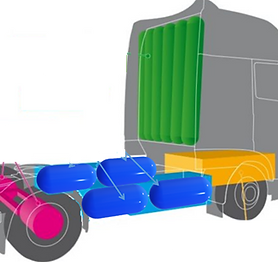
Cluster 2 - Energy Transition
Case descriptions for these cases will be published soon.

Prediction model of sustainable power in Port of Rotterdam
Develop a 15-minute forecast model for shore power consumption by large container vessels in the Port of Rotterdam. Help reduce fossil fuel use and emissions by enabling cleaner, smarter energy use—contributing to a more sustainable, low-carbon port of the future.


Design for implementation of novel power cycle in truck
We are looking for designs on how our novel power cycle can be implemented in a truck. We are asking for a conceptual design as well as sizing and weight estimation and compare it with conventional diesel based, electric battery based and fuel cell-based truck.


Noise reduction at Transformer stations
With an increasing need for transformer stations due to energy system electrification, noise pollution caused by these stations is a growing concern. Your challenge is to develop innovative noise-reducing solutions that are scalable, energy-efficient and adhere to regulations and environmental standards, without compromising transformer efficiency.


Sustainable Energy Integration and Circular Installations
Tackle the energy transition's challenges! Join our interdisciplinary team to develop an Environmental Impact Assessment (EIA) and create innovative solutions for minimizing energy consumption and promoting circular installations. Make a real impact on sustainable energy integration in existing buildings and networks.


Electrifying Steel: Towards a Sustainable Future
By implementing direct electric heating to reach 1200°C, this project aims to revolutionize steel re-heating, effectively eliminating CO2 emissions while reducing costs. Students will contribute to cutting-edge research in sustainable industrial processes. Efforts will be made both in market scoping and development of a Proof of Concept installation.


KNUST Sustainable Energy Challenge
KNUST (Ghana) strives to use more sustainable energy on campus. It currently has 80 backup diesel generators (dataset available).
The team should employ data analysis techniques, technology driven research, and economic models to identify potential solution(s) that:
-reliably meet energy needs
-reduce carbon footprint
-are economically competitive
Students should travel to Ghana for data collection & interviews. Limited funding available.


Improving well intersections in Advanced Geothermal Systems
Advanced Geothermal Systems require connecting different wells in the subsurface to create closed loops. These loops function as heat exchangers to produce the heat of deep earth layers. The objective of this JIP project is to develop a more effective method to improve these crucial intersections.


Powering KLM with Hydrogen - Generation and distribution
HyER Power & CWD assess the technical and financial feasibility of the HyER Power Plant (fuel cell-heat pump system with buffer technology) and hydrogen generation (via KLM’s solar panels) for KLM real estate. The main focus is integration with existing systems, enabling an optimal energy system.


Learning Community
Sustainable Offshore Wind Energy and Renewable Energy Storage for Curaçao
Despite its renewable energy potential, Curaçao faces technical, economic, and environmental challenges in implementing large-scale offshore wind farms and integrating energy storage systems. There is a need for a systemic engineering analysis that evaluates the feasibility, resilience, and sustainability of such a combined offshore wind and energy storage infrastructure tailored to the island’s geographic and socio-economic context.






